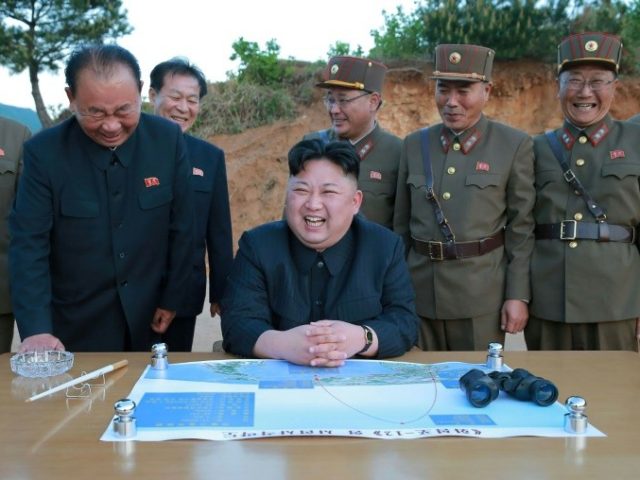North Korea’s patrons in Beijing appear paralyzed by conflicting strategic priorities during the current crisis, although the Communist Party organ Global Times did publish an editorial declaring that China would remain neutral if North Korea starts a war but intervene on North Korea’s behalf if the U.S. and South Korea attempt a preemptive strike.
The Chinese government may eventually seek some diplomatic wiggle room by insisting the Global Times is but a newspaper printing an editorial, and the piece is written in the style of newspaper editors lecturing officials about what they “should” do, but few outside observers would be willing to pretend that China’s state-run media is anything but a mouthpiece for its authoritarian government. The Washington Post is among many media outlets that regard the Global Times editorial as an official message directed at Pyongyang.
To the extent that anything about the current standoff can be taken as humorous, it is amusing to read the Global Times portraying North Korea as the aggrieved party taking a desperate gamble to “propel the U.S. to negotiate with it,” as if the civilized world has not indulged North Korea with decades of negotiations.
“In the near future, it would be highly sensitive if US B-1B fighter jets fly over the Korean Peninsula or North Korea launches missiles in the direction of Guam. Both sides would upgrade their alert to the highest level. The uncertainty in the Korean Peninsula is growing,” the Global Times writes as if American planes flying over South Korea is morally equivalent to North Korea firing a salvo of missiles at an island with over 150,000 civilians living on it.
After promising that “China will respond with a firm hand” to whatever provocative actions may come, the Communist paper declares:
China should also make clear that if North Korea launches missiles that threaten US soil first and the US retaliates, China will stay neutral. If the US and South Korea carry out strikes and try to overthrow the North Korean regime and change the political pattern of the Korean Peninsula, China will prevent them from doing so.
Lopsided as that formulation may be, optimists will find some significance in Beijing sending a message to Pyongyang that it will not protect the Kim regime if it fires the first shots in a war – at least, not the first missile shots; China has been willing to indulge North Korea’s occasional murder of South Koreans with torpedoes and artillery barrages.
Reuters finds China angry and frustrated that its peacemaking efforts have not defused the crisis, noting that one of the factors in Beijing’s lackluster response is a curiously-timed holiday that seems to have taken both the Foreign Ministry press shop and President Xi Jinping offstage for a few weeks.
An Asian diplomat also reminded Reuters that China is involved in a rather odd border dispute with India at the moment – a story flying under the radar for foreign observers but apparently a priority for the Chinese foreign policy establishment.
Other Chinese priorities suggested by Australia’s ABC include restless Uighur Muslims, resurgent nationalism in Taiwan, and China’s claims in the South China Sea.
Sun Zhe of the Columbia University School of International and Public Affairs told Reuters that China is more worried about the American deployment of the THAAD anti-missile system in South Korea than about the United States attacking North Korea. China, and Russia, are worried that THAAD’s powerful radar systems will give the U.S. and its allies too much information about what occurs beyond the Korean border.
In a similar vein, China is angry that Japan is talking about enhancing its own defenses and developing serious offensive capabilities for the first time since World War II. This could be a major obstacle for China’s plans to dominate the South China Sea and East China Seas in the years to come.
The strangest aspect of China’s response is its insistence that it has minimal influence over North Korea and has done all it could to prevent the situation from escalating. It is easy enough to understand why China would say that to international audiences, but within Beijing’s halls of power, planners must have realized that North Korea would eventually achieve nuclear ICBM capability and a crisis would ensue. Even if North Korea’s recent rapid advances in missile technology caught the Chinese by surprise, they must have known only a few years remained at best before this day arrived.
Of course, no matter how many warnings China may have been given beforehand, one immutable reality of the situation is that Beijing is extremely reluctant to take the strongest measures available against North Korea because they’re terrified of causing the North Korean regime to collapse and flood China with refugees.
For China, bringing the Kim regime down is a guaranteed disaster, while a nuclear North Korea is only a potential menace. Unfortunately, we’re far beyond the point where tough, but not catastrophic, sanctions from China could have persuaded North Korea to abandon its nuclear program.

COMMENTS
Please let us know if you're having issues with commenting.